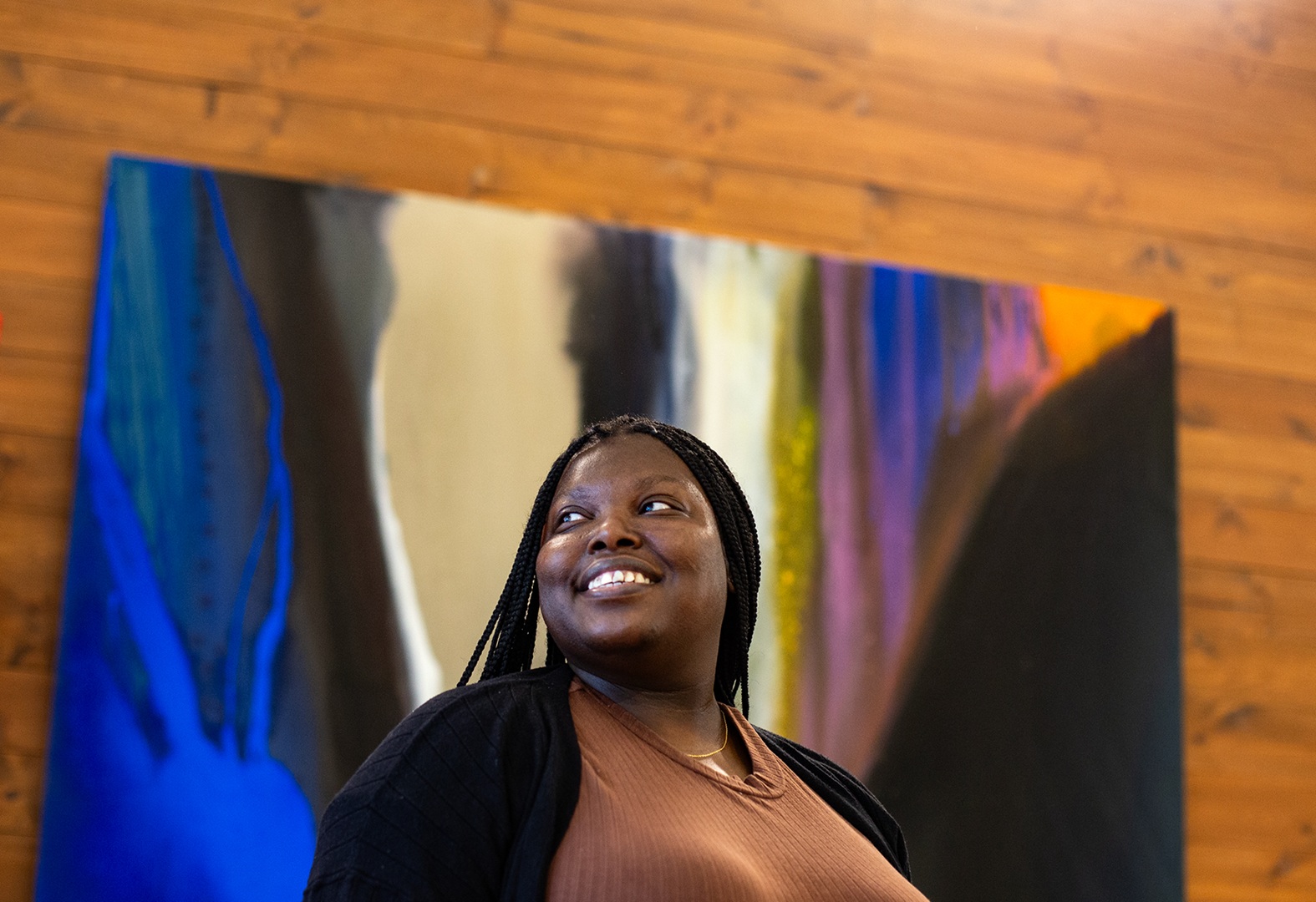Student represents UHV during summer research program

This summer has been a memorable one for Shaniqua Easter. The University of Houston-Victoria psychology student spent the better part of her summer representing UHV during a research program at the University of Pittsburgh, an experience that is not only unforgettable, but has changed the course of her career aspirations.
“Being a part of this program has opened my eyes so much,” Easter said. “I would love to have my own clinic one day and provide support for children, especially those coming from marginalized communities.”
From mid-June through early August, Easter was part of the Mobilization and Political Economy Summer Research Program held at the University of Pittsburgh. The program offered training in research methodology, professional development and mentorship opportunities.
“As the Rotaract Club at UHV faculty advisor, I’ve had the pleasure of working with Shaniqua, who serves as the club’s vice president,” said Brooke Garcia, UHV clinical assistant professor of management. “I was thrilled about this opportunity for her. An experience such as this can be transformational, shaping a student’s future academic and career choices. And for a student who was already community service minded, I can see her applying the knowledge she gained to the benefit of the Victoria community.”
Along with the training, the program covered travel, lodging and living expenses along with a stipend. The program is designed to train undergraduate students from underrepresented groups in research while supporting their transition into graduate social science programs.
Initially, Easter said she learned about the program through an email sent to students last semester who were interested in social sciences at UHV. She admitted she was skeptical about her chances of being accepted into the program, but she applied anyway. Originally waitlisted, Easter was offered a spot and immediately took it.
“I was so excited but also in disbelief,” the senior said. “At first, I thought it might be a scam.”
Easter’s motivation to apply stemmed from a Texas government class assignment in which students were tasked with reaching out to their local Congressional representatives. Most students in the course decided to reach out to the congressman here in Victoria, but Easter said she decided to reach out to her congressman in her hometown of Shreveport, Louisiana.
“I got in touch with the office of Speaker of the House Mike Johnson, and this was about two weeks before he got his position,” Easter said.
Through email exchanges, Easter discussed with his office the need for mental health awareness for children and marginalized communities. The assignment would build her foundation and spark her interest in research and advocacy, Easter said.
During the course of the 8-week program, she was paired with her mentor, Tony Carey, a political science professor at the University of Pittsburgh. Despite an initial shaky start – missing her flight and feeling out of place among her peers – Easter said she grew confident with the support of her mentor, the teaching assistants and fellow participants.
Easter said she was surprised to see a diverse set of students coming from all across the nation. Some of the students came from Johns Hopkins University, Clemson University, Howard University and even as far as the University of Puerto Rico.
“I was the oldest in the program, surrounded by very smart younger students,” Easter said. “At first, I felt a bit insecure being there, but the support and guidance I received helped me understand the research process; it was an amazing experience.”
During the course of the program, students were taught how to conduct descriptive statistics, use programs such as RStudio/Rmarkdown, NVivo, and to conduct quantitative and qualitative data analyses. At the end of the program, she had an entire research proposal drafted and was able to present at a symposium.
Easter’s research question was: “Does Witnessing Violence Negatively Affect the Economic Stability and Interpersonal Relationships of Men and Women of Color?”
The research question was inspired by her own experiences growing up in a challenging environment. The question centered mainly on exploring how exposure to violence can have an impact on economic stability and interpersonal relationships, particularly among marginalized communities with limited resources.
“The area I grew up in was horrible; sometimes I would get up at three o'clock in the morning and get on the floor because there were gunshots, and that affected us a lot. We didn't have very healthy coping mechanisms,” Easter said. “We never really had someone to talk to; we never had therapists. We never got to express our feelings. The children in the community needed help, and what I suggested was that maybe we could get some programs to do some mental health awareness events, let them express those feelings that they're having and let them know that it's okay to feel this way. And with these programs, there is hope that they will break that cycle of violence.”
At the end of the summer program, the researchers all presented their findings inside a lecture hall at the University of Pittsburgh. After the presentation, there was a 10-minute question-and-answer session, and everyone offered their feedback, not just from mentors and teaching assistants, but from people who came through the program in the past, she said.
“We all had a time slot during the symposium. I was the last to go, and I was so nervous, but it was amazing,” Easter said. “The nervousness was curbed because the week leading up to the symposium, we had practice with the teaching assistants with our presentations.”
Looking back over her time in Pittsburgh, Easter said the experience led her to slightly change course in her aspirations. Initially interested in school psychology, Easter is now leaning toward pursuing a Ph.D. in clinical neuropsychology to focus on research-based mental health interventions in children, she said.
"I want to be able to reach children and provide them with the mental health support they need," Easter explained. "The program helped me realize my passion for research, and the potential to make a real difference in people's lives."
The University of Houston-Victoria, located in the heart of the Coastal Bend region since 1973 in Victoria, Texas, offers courses leading to more than 50 academic programs in the schools of Arts & Sciences; Business Administration; and Education, Health Professions & Human Development. UHV provides face-to-face classes at its Victoria campus, as well as an instructional site in Katy, Texas, and online classes that students can take from anywhere. UHV supports the American Association of State Colleges and Universities Opportunities for All initiative to increase awareness about state colleges and universities and the important role they have in providing a high-quality and accessible education to an increasingly diverse student population, as well as contributing to regional and state economic development.

